Cobalt is an important element used to manufacture rechargeable batteries. Cobalt has unique properties that help improve thermal stability, which is critical for the batteries to function properly. It also helps improve some batteries’ energy density, so they can last longer.
The demand for cobalt is high, so geologists need fast, accurate tools to help them meet these requirements. Portable X-ray fluorescence (pXRF) analyzers are one of these tools, as they provide on-the-spot material chemistry results.
Why Choose Portable XRF for Cobalt Exploration?
Portable XRF provides rapid, in situ, multielement geochemistry for immediate results in the field. This is useful for greenfield and brownfield exploration, ore grade
For battery metal exploration, portable XRF provides decision-quality data faster than traditional, lab-based XRF, and also enables more discriminatory laboratory sampling, helping reduce costs and improve ROI. With sample preparation, pXRF produces high-quality quantitative data that is comparable to laboratory analysis.
Challenges with Analyzing Cobalt
XRF is prone to inter-element interferences. Iron (Fe) on cobalt (Co) and nickel (Ni) on cobalt (Co) are two common examples. This means that when a lot of iron is present, it becomes difficult for XRF to identify cobalt at low levels. Likewise, the presence of nickel also makes it difficult for XRF to ID cobalt. Unfortunately, cobalt is routinely explored for in the presence of significant amounts of iron and nickel.
To solve this challenge, we developed a GeoChem method for Vanta™ pXRF analyzers that offers improved analysis for battery metals exploration by being able to detect cobalt in the presence of iron and nickel. This innovative method overcomes the interference that has historically made it very difficult for portable XRF analyzers to detect cobalt in the presence of these other elements.
The method we developed for the Vanta analyzer is built on the current GeoChem method, but with a more sophisticated way of deconvoluting the iron/cobalt/nickel peaks. Before deploying this solution, we tested it on client samples to make sure that it produced good results.
Test Results
We analyzed 16 samples with high iron content—9% < Fe < 50%, 50 ≤ Co ≤ 6000 ppm, Ni < 500 ppm. We also analyzed 50 samples with a moderate amount of iron—0.5% < Fe < 15%, 16 < Ni < 8000 ppm, 50 ppm < Co < 2.3%. The samples were pulps in XRF cups, and they were analyzed using 60 seconds per beam with no corrections. The graphs below show excellent agreement between the results obtained from a lab and | 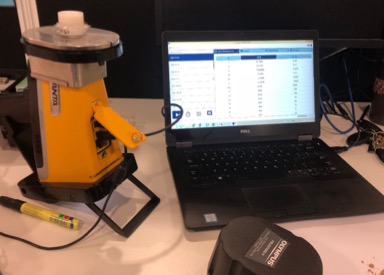 Vanta M Series analyzer docked in a field stand and connected to a PC. |
Results - Co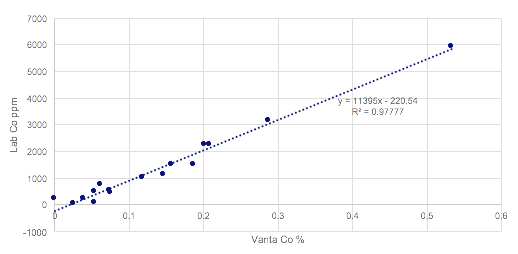 | Results - Fe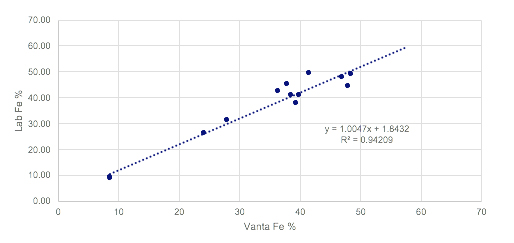 |
Results - Co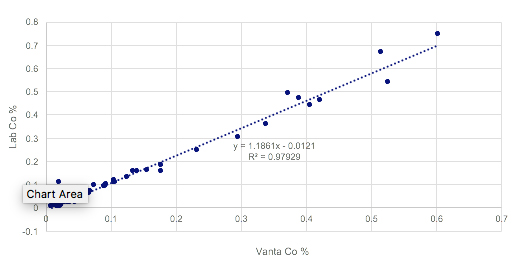 | Results - Fe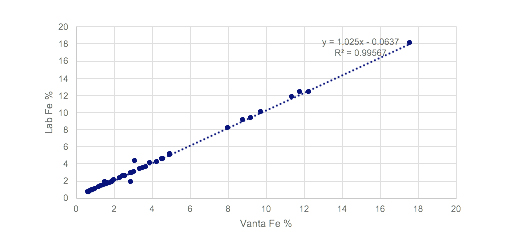 |
Results - Ni
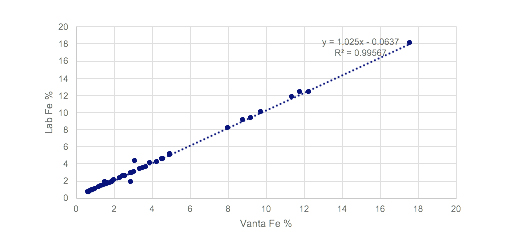
Related Content
The Power of pXRF for Cost-Effective Decisions for Mineral Exploration Programs
Identifying Rock Types and Mineralization with XRF at the Mount Pleasant Mine
Portable XRF Geological Logging with Vanta Analyzers
Get In Touch

